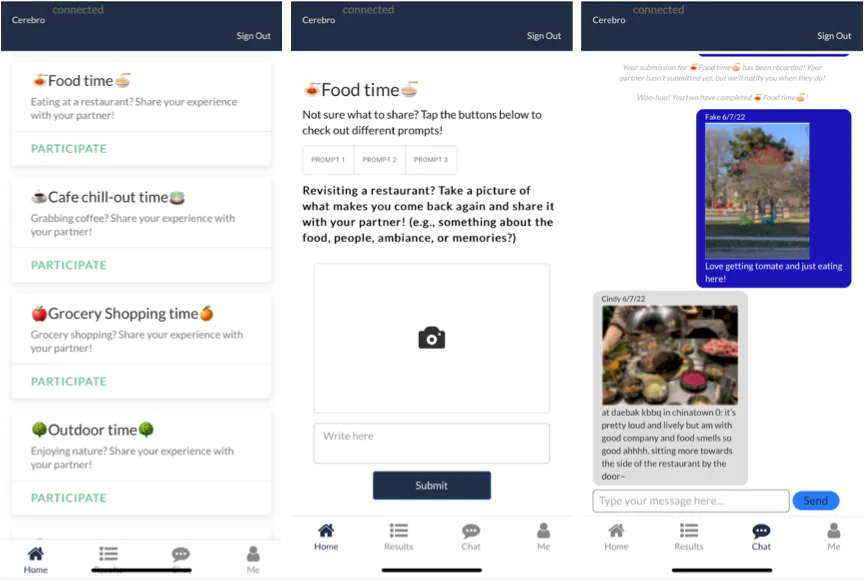OCEs for Relationship Development

Project description
Screenshots of the Cerebro app that highlight the process in which users participate in shared activities while in a shared affordance.
Dedicating time to meeting new people could be hard for someone who is busy, and the global pandemics have greatly reduced the chances of spontaneous interactions. Social media brings up new opportunities to get to know strangers, yet people rarely direct message strangers to initiate conversations. When chatting face-to-face, we can talk about the shared physical space we are in, like a cafe or restaurant, but we lack this initial common grounding for socializing online. To explore that idea, we have designed opportunistic collective experiences (OCEs) with situated prompts. We implemented the OCEs in Cerebro, a context aware mobile app that facilitates delivery and completion of situated prompts.
The system first identifies opportunities in a user’s life moments as they go about their day, and prompts the user with an OCE based on their situations. Each OCE has a situated prompt that is meant for guiding the user to self-disclose about their personal decisions, preferences, or experiences relevant to these slices of life moments. For example, when a user is at a restaurant, it will notify the user to participate in an OCE with a prompt asking about their dining experience and where they are sitting at the moment. The user would then participate by responding to the prompt with a picture and captions. Once two users have submitted to the same OCE, they would be able to view each other’s sharing.
Currently, we are prototyping Blast from the Past (BftP) prompts, which aim to work in conjunction with OCEs through additional prompts that encourage the users to share photos of their past memories as related to their current experiences. After both users submit to an OCE, a BftP prompt related to the OCE they just submitted to will be sent for them to submit a photo and caption to. Through BftP prompts, we seek to surface opportunities for users to learn about each other's background, interests, and hobbies - information that may not as easily be surfaced in simply OCEs - while still maintaining the shared context created through the OCE.
In addition to the Cerebro, we created a small prototype of web-chat, where users could ask the system for LLM generated contextual prompts that help with self-disclosure and conversation development.
Team
Ph.D. Students
- Alumni: Ryan Louie
- Alumni: Vsevolod (Seva) Suschevskiy
Masters and Undergraduate Students
- Alumni: Cindy Hu
- Alumni: Grace Wainaina
- Alumni: Mary Truong
- Alumni: Mason Lin
- Alumni: Navin Gopaul
- Alumni: Victoria Tran
- Alumni: Yvan Chu
- Alumni: Zachary Cmiel